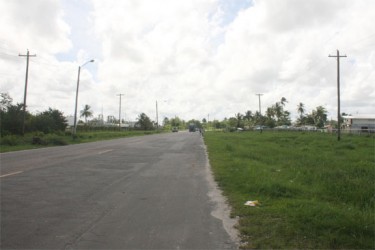An overhead walkway between the East and North Ruimveldt Multilateral Schools and a designated cycling lane spanning the length of Sheriff Street and Mandela Avenue are to be included in the final draft design of the Sheriff Street/Mandela Avenue Expansion Project.
This was revealed by Manager of Tech Services at the Public Works Ministry Rabindranauth Chandarpal ahead of this week’s presentation of the final draft design to stakeholders for them to judge if their concerns were taken into consideration in its preparation.
The idea to install these two features to the structure, Chandarpal said, came after examining what has been done by other countries in the region, including Trinidad and Tobago. The overhead crossing is a feature that was included in the project to ensure the safety of school children who cross the road to access transportation, among other reasons. The situation as it exists is somewhat hazardous since large numbers of school children from both schools are known to congregate on either side of Mandela Avenue after school and during breaks. Additionally, many of them are required to cross the road to access transportation.

Since Mandela Avenue is a very busy road this presents some degree of danger. And, the fact that the turn on Mandela which brings vehicles off of the East-West section of the corridor onto the North-South Section is somewhat acute, motorists, especially those who might be speeding, are in danger of colliding with children or anyone who may be crossing at the time.
Chandarpal said that the expansion of Mandela Avenue into a four-lane road may just increase these risks as the ministry envisages that more vehicles will be able to use the roads at the same time. There is also the likelihood, he explained, that many of these vehicles will also be speeding.
The overhead crossing is expected to eliminate this risk. Once installed, students from either school will have the option of using the crossing which will take them over the moving traffic, getting them to the other side safely. The ministry also expects that adults will also capitalise on the availability of the pass.
But, there are some uncertainties. Research in countries which have already installed such structures have shown that many pedestrians are reluctant to use them and have opted to cross roads the traditional way. To address this possibility, Chandarpal said that the ministry will be working with the schools towards encouraging their students to use the crossing. Once installed, this will be the first such structure to be built in Guyana and Chandarpal said that it will be a good pilot. He also expects that adults and the elderly may be hesitant to use the structure and may opt to cross the road the traditional way.
Bike lane
A designated cycling lane will also be installed throughout the length of Sheriff Street and Mandela Avenue. This will allow cyclists to ride their bikes on the roadways while remaining out of the way of vehicular traffic. Along with the designated cycling lane to be built from Providence to Diamond in the East Bank Four-Lane Expansion Project, these will be the first two facilities of their kind in Guyana.
Other aspects of the project will include the installation of sidewalks on both sides of Sheriff Street and the installation of street lights. Mandela Avenue is also expected to benefit from the installation of sidewalks on both sides of the North-South section of the corridor, while only the northern section of the East-West Corridor is to be fitted with a sidewalk.
These works are part of the government’s Sustain-able Urban Transport Plan and are being funded by the Inter-American Deve-lopment Bank (IDB) at a cost of US$24 million.
Several designs have been drawn and redrawn after soliciting input from stakeholders on several occasions. Members of the business community along Sheriff Street, schools and residents were all involved in the consultations. Inputs from these stakeholders have resulted in several changes being made to the project. For example, Sheriff Street was also to be made a four-lane corridor, but after the business community along the corridor indicated that it was not in favour of such an initiative, a decision was taken to scrap plans to add two more lanes.
The latest draft design, which has been scrutinised by Ministry officials as well as the IDB, will be presented to stakeholders again next week before the project moves ahead.









